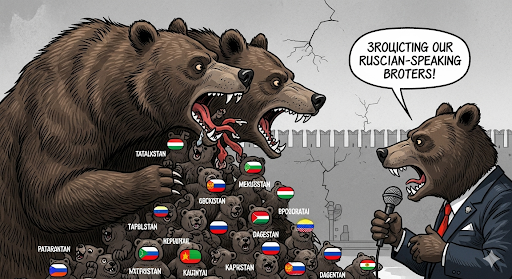Russia is intensifying disinformation operations in the Baltic states through systematic recruitment of local residents. On 19 November 2025, Anadolu Agency reported that Russian intelligence services recruit Latvian residents via Telegram channels and during trips to Russia, targeting low-income groups and young people seeking money. The article begins:
Russia is allegedly intensifying its disinformation and propaganda operations against Western countries, particularly in the Baltic states, Lithuanian broadcaster LRT reported Tuesday. Russian intelligence services have been recruiting Latvian residents via Telegram channels or during trips to Russia to spread their views, according to the report. Those targeted are reportedly drawn from low-income groups or young people seeking to earn money. LRT cited the case of videographer and blogger Oleg Besedin, who was arrested in Estonia in early November after years of allegedly cooperating with Moscow outlets, producing documentaries and reports aligned with Kremlin rhetoric.
Key Points
- Russian intelligence services recruit Latvian residents via Telegram channels or during trips to Russia, targeting low-income groups and young people seeking money to spread Kremlin views, with the Estonian State Prosecutor stating recruited individuals receive specific instructions on stories to publish and political directions to support.
- Videographer Oleg Besedin was arrested in Estonia in early November after years of allegedly cooperating with Moscow outlets producing documentaries and reports aligned with Kremlin rhetoric, suspected of participating in information influence campaigns in cooperation with people who live and work in Russia.
- Latvian pro-Kremlin activist Aleksandrs Gaponenko claimed during an online conference hosted by the Institute for CIS Countries that ethnocide was taking place in Latvia, arguing Moscow would need to prepare ideological groundwork before pursuing humanitarian intervention in the Baltic states, leading to charges of assisting a foreign state.
- The Fund for the Support and Protection of Compatriots Living Abroad, overseen by the Russian Foreign Ministry, continues financing Russian influence operations in Baltic states and covering legal costs for pro-Kremlin activists facing lawsuits, according to the Constitution Protection Bureau.
Russia’s Influence Operations in the Baltics: Targeting Estonia, Latvia, and Lithuania
Russian influence operations in the Baltic states have intensified dramatically since Moscow’s full-scale invasion of Ukraine, targeting Estonia, Latvia, and Lithuania through a sophisticated blend of social media manipulation, disinformation campaigns, and cyber-enabled operations. Moscow exploits Russian-speaking minorities through platforms like Telegram, TikTok, and Facebook, spreading narratives that portray Baltic language policies as discrimination while falsely branding restrictions on Russian state media as violations of free speech comparable to Nazi actions. Recent investigations reveal that Russia pays young Baltic residents to spread pro-Kremlin narratives, with Estonian authorities detaining videographer Oleg Besedin for following direct Russian intelligence instructions on influence campaigns.
The strategic depth of these operations extends far beyond digital platforms. Secret Kremlin documents obtained by international journalists reveal that Russia’s Directorate for Cross-Border Cooperation prepared comprehensive plans in autumn 2021 to enhance soft power through education, culture, and social networks while funding pro-Russian NGOs, preserving Russian-language education, and opposing Soviet monument demolitions. A 136-page analytical report released by Russia detailed strategies to bypass propaganda restrictions by exploiting platforms with large Russian-speaking audiences. Beyond information warfare, the state-sponsored cyber espionage group UNC1151 conducts the “Ghostwriter” campaign, promoting anti-NATO narratives while compromising social media accounts of Polish officials to publish politically disruptive content.
Research demonstrates a measurable impact on regional stability. Quantitative studies found that Russian disinformation increases perceived distrust of governments and heightens the sense of military threat, with observable decreases in citizens’ incentives for investment activities. Lithuanian security services report approximately 900 Russian-language false warnings about school explosives, timed to coincide with academic schedules and teachers’ strikes. Moscow has also legitimized fringe disinformation outlets like “The Baltic Word” through Kremlin-owned media such as Baltnews and Sputnik, thereby granting credibility to sources linked to cyber-espionage campaigns.
The Baltic states have responded with comprehensive protective measures. Estonia transitioned to Estonian-only school instruction by 2030 and enacted legislation requiring the Russian Orthodox Church to sever ties with the Moscow Patriarchate, while Latvia mandated that public media broadcast exclusively in Latvian or European languages by 2026 and amended immigration laws requiring Russian nationals to pass language tests. Former Latvian President Egils Levits emphasized that national cohesion serves as the primary defense against Moscow’s “undefeated imperialistic spirit.”
External References:
• Secret Kremlin document reveals Russia’s plans for Baltic states
• The Baltic States as Targets and Levers: The Role of the Region in Russian Strategy
• Russian influence operations against Baltic states and Poland having ‘significant impact’ on society
Disclaimer: The Global Influence Operations Report (GIOR) utilizes AI throughout the posting process, including the generation of summaries for news items, introductions, key points, and, often, the “context” section. We recommend verifying all information before use. Additionally, all images are generated using AI and are intended solely for illustrative purposes. While they represent the events or individuals discussed, they should not be interpreted as real-world photography.
IInnovation











